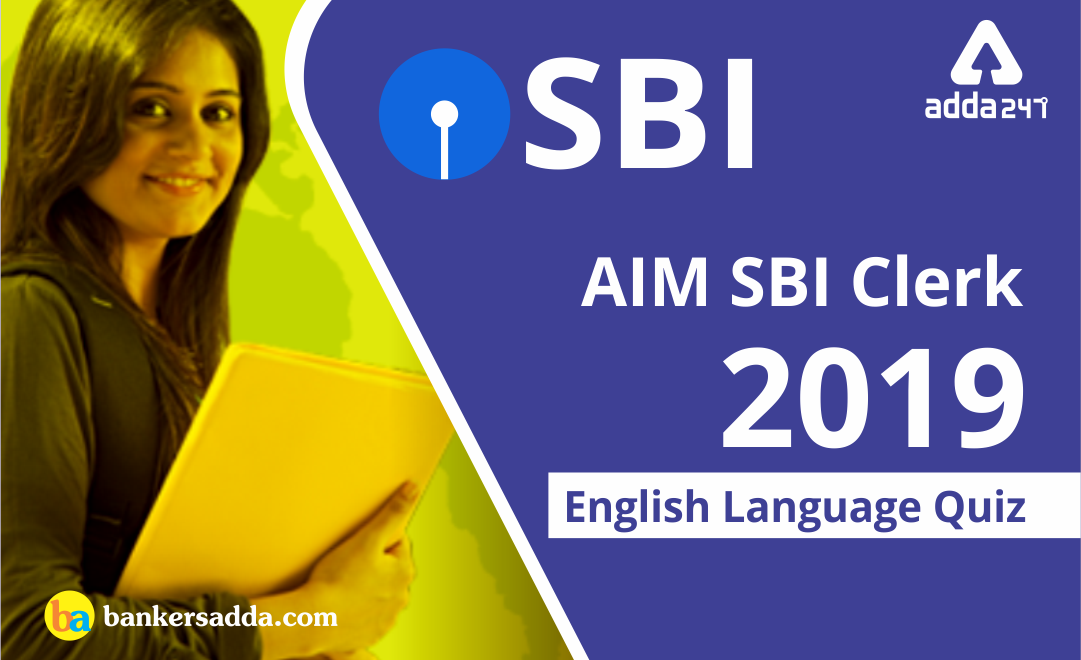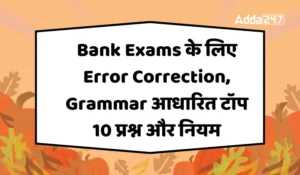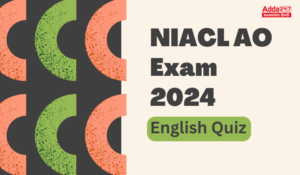SBI Clerk Prelims English Questions (Day-9)
Dear students, The State Bank of India conducts a two-tier examination to recruit Clerks (Junior Associates) at regular intervals. Thus, the English Language plays a crucial role in sailing through all the stages of SBI Clerk exam. Here is a quiz on the English Language to let you practice the latest pattern English Questions for SBI Clerk 2019-20.
Directions (1-10): Which of the following phrases among (I), (II), and (III) given below each sentence should replace the phrase/expression printed in bold to make the sentence grammatically correct? Choose the best option among the five given alternatives that reflect the correct use of phrase in the context of the grammatically correct sentence. If the sentence is correct as it is, mark (e) i.e., "No correction required" as the answer.
Q1. Can Indian civil servants offered effectively in the country’s socio-economic development in the absence of specialisation within their ranks?
(I)deliver effectively
(II)furnish effectively
(III)deliberately offer
Only (I)
Only (III)
Both (I) and (II)
Both (II) and (III)
No correction required
Solution:
Read the expression given in bold carefully, the question begins with a modal verb “can” which should be followed by the first form of the verb (i.e., base form). Thus, the use of the verb “offered” makes the sentence grammatically incorrect. Moreover, the word “offer” is contextually incorrect as it doesn’t give a meaningful sense to the sentence. In the context of the sentence, the most suitable word is “deliver” or “furnish”. Thus, both the expressions (I) and (II) can be used as replacements to the highlighted one. Hence option (c) is the correct choice.
Q2. India can learn from countries such as Austria, Belgium, Norway, Romania, UK, etc. which provide vocational training to improve employability of women migrants and access to support services.
(I)improving employable women migrants
(II)in a bid to improve the living standard of all
(III)to transfer the opportunities to women migrants
Only (I)
Both (II) and (III)
Only (III)
All (I), (II) and (III)
No correction required
Solution:
The highlighted expression used in the sentence is grammatically correct and at the same time gives a meaningful sense to the sentence. Hence option (e) is the correct choice.
Q3. I had to ask them to repeat their salary offer because it just seemed too good to have been true!
(I) to be true
(II) to become true
(III) have becoming true
only (I)
Both (II) and (III)
only (III)
All (I), (II) and (III)
no correction required
Solution:
The sentence can be made grammatically correct and contextually meaningful by replacing the phrase given in bold “to have been true” with “to be true”. It is to be noted that the correct grammatical syntax requires [too + positive degree + to + V1] which is not provided in the given sentence. Only option (a) perfectly fits in the absolute grammatical syntax of the sentence, hence, it becomes the most suitable answer choice.
Q4. If I have been you, I would not place too much trust in their findings.
(I) Had I been you
(II) If I were you
(III) If I was you
only (I)
Both (I) and (II)
Both (I) and (III)
All (I), (II) and (III)
no correction required
Solution:
Read the sentence carefully, it clearly expresses a wish which is cannot be fulfilled. In cases like these, “if I were you” is used to express subjunctive mood. Usually we use ‘was’ if the condition is possible but not true. Like if I was a pilot but in reality, I'm not. But I can never be you so then we should use “were”. Moreover, the sentence is expressing an impossible condition in the past and its probable result in the past. These sentences are truly hypothetical and unreal, because it is now too late for the condition or its result to exist. Thus, with both the rationale alternative (I) and (II) becomes correct. Hence, option (b) becomes the most suitable answer choice.
Q5. Unless you will study diligently, you'll never understand trigonometry.
(I) you have to study
(II) you study
(III) you will be studying
only (I)
Only (II)
Both (I) and (II)
All (I), (II) and (III)
no correction required
Solution:
To make the sentence grammatically correct and contextually meaningful, replace the phrase given in bold with “you study”. It is to be noted that when two events of future have been mentioned, the clause starting with “if, when, as long as, before, after, unless” etc., take the syntax of simple present tense; while, the main clause will be moulded in future tense. For ex., “If he comes here, I will help you”. Hence, option (b) becomes the most viable answer choice.
Q6. Her life was on a new course now, and the future looked brighter than it ever had.
(I) than it ever were
(II) than it has been
(III) than it ever will
only (I)
Only (II)
Both (I) and (II)
All (I), (II) and (III)
no correction required
Solution:
The highlighted expression used in the sentence is grammatically correct and at the same time gives a meaningful sense to the sentence. Hence option (e) is the correct choice.
Q7. I prefer to walk than to drive in a big city like Tokyo.
(I) walking than driving
(II) walk to drive
(III) walking to driving
only (III)
Only (II)
Both (I) and (II)
All (I), (II) and (III)
no correction required
Solution:
To make the sentence grammatically correct and contextually meaningful, replace “to walk than to drive” with “walking to driving”. It is to be noted that with some verbs and word-groups, such as “to be afraid, to forget, to hate, to like, to dislike, to prefer” the infinitive is mostly used with reference to a special occasion, the gerund being more appropriate to a general statement. Since the speaker is making a general statement about his preference, Present Participle (V4) should be used which takes the form of gerunds. Moreover, ‘prefer’ is followed by the preposition ‘to’. Hence, option (a) becomes the most suitable answer choice.
Q8. His long and eventful career, while, crossed soon afterwards by his death on the 26th of July 1712.
(I) however, terminated soon
(II) notwithstanding, discontinued soon
(III) since, ceased early
only (III)
Only (II)
Both (I) and (II)
All (I), (II) and (III)
no correction required
Solution:
The sentence can be made grammatically correct and contextually meaningful by replacing the phrase given in bold with either expression (I) or (II). Both the expressions provide absolute contextual meaning to the sentence. The adverb ‘however’ is used to express in whatever way; regardless of how; while, ‘notwithstanding’ expresses nevertheless; in spite of this. Hence, option (c) becomes the most feasible answer choice.
Q9. Aadhaar has established itself as the primary form of identity, with more than nine out of 10 respondents using it for this purpose.
(I) has established it
(II) have been established it
(III) had establishing itself
only (III)
Only (II)
Both (I) and (II)
All (I), (II) and (III)
no correction required
Solution:
The highlighted expression used in the sentence is grammatically correct and at the same time gives a meaningful sense to the sentence. Hence option (e) is the correct choice.
Q10. She's in the most unique position of running for office against her husband.
(I) on the few unique
(II) in the much unique
(III) in the unique
only (III)
Only (II)
Both (I) and (II)
All (I), (II) and (III)
no correction required
Solution:
To make the sentence grammatically correct and contextually meaningful eliminate ‘most’ from the phrase given in bold. It is not correct to use ‘most unique’ or ‘very unique’ since unique means one of a kind, not rare or unusual. Therefore, words like ‘unique, universal, impossible’ are not used in superlative or comparative degrees. Hence, option (a) is the most suitable answer choice.
Directions (11-15): In the following questions, a part of the sentence is given in bold which may or may not be fitting into the sentence either due to grammatical error or contextual error. There are four expressions given below each sentence, out of which one of them can be used to replace the existing highlighted phrase to make the sentence both grammatically and contextually correct. Choose the most appropriate alternative among the five options that determine the correct phrase that should replace the phrase given in bold. If the phrase given in bold doesn’t require any replacement, choose option (e) i.e., “No correction required” as your answer.
Q11. The banking industry had begun already incorporating blockchain.
began already
has already begun
have already begun
will began already
no replacement required
Solution:
To make the sentence grammatically correct, replace the phrase given in bold with [has already begun]. Here, “already” is an adverb which should be placed in the mid position in the sentence i.e., after the first auxiliary verb or after a modal verb when more than one verb is present. Moreover, the subject [The banking industry] is singular, therefore, the verb associated with the subject should also be in its singular form. Hence, option (b) becomes the most suitable answer choice.
Q12. They would probably be leaving very soon and anything she had done hurrying the process meant they would get to Ashley sooner.
she did hurriedly
she might have done hurriedly
she do to hurry
she could do to hurry
no replacement required
Solution:
The sentence can be made grammatically correct and contextually meaningful by replacing the phrase given in bold [she had done hurrying] by [she could do to hurry]. All the other given expressions fail to be grammatically correct. Hence, option (d) becomes the most suitable answer choice.
Q13. The dacoits looted the house and before the police arrived the things were taken away.
the things was taken away
they took away the things
the things were taken off
they taken away the things
no replacement required
Solution:
When the actions performed by the doer is more than one then we use active voice for those actions.
Q14. The changing Henry’s life is drastic when he lost all his money on the stock market.
Henry’s drastically changing life
Henry’s life changed drastically
The drastic changes in Henry’s life
The life of Henry changed drastically
no replacement required
Solution:
The correct phrase that should replace the incorrect phrase given in bold should be “Henry’s life changed drastically”. It is to be noted when a living thing owns something, apostrophe (‘) and “s” is used while when a non-living thing “owns” something, “of” is used; example– “Mr. Sharma’s hat” and, “The cap of the pen”. Therefore, option (b) becomes grammatically as well as contextually correct answer choice.
Q15. Everyone felt sorry for Kevin since his wife’s immoderate shopping bills always exceeded the amount of money he made.
amount of money he makes
the amount of money he have made
amount for money he made
the amount makes by him
no replacement required
Solution:
The given sentence is grammatically correct and contextually meaningful. As, the phrase given in bold completely justifies the grammatical and contextual structure of the sentence, it does not require any correction or replacement. Hence, option (e) becomes the most suitable answer choice.





 Practice for English Section: 15 Cloze T...
Practice for English Section: 15 Cloze T...
 Bank Exams के लिए Error Correction, Gram...
Bank Exams के लिए Error Correction, Gram...
 English Quiz For NIACL AO Mains 2024 Exa...
English Quiz For NIACL AO Mains 2024 Exa...










